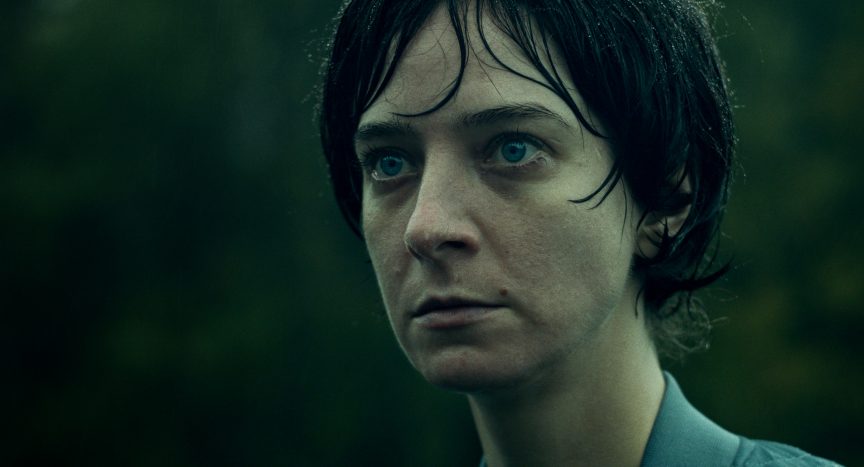Violation is a film that drifts along on a tangible creeping dread, the hairs standing up on the back of your neck, like waking up after a particularly harrowing nightmare. Tall trees resemble the sentries of a crypt rather than a bucolic pastoral setting, gorgeous aerial shots of a car winding through lush forest interspersed with a wolf violently attacking a rabbit. From the painterly strokes of the opening credits, it is clear something terrible is going to happen, that nothing will leave these shadowy paths wholesome or whole.
Swooping down to human scale, we join the inhabitants of the car on a drive that is obviously tense. Miriam (director/writer Madeleine Sims-Fewer pulling triple duty) and her husband Caleb (Obi Abili) are on their way to a remote countryside cabin. Miriam’s younger sister Greta (Anna Maguire) and her husband Dylan ( Jesse LaVercombe) has left London for more rural pastures, and this visit is implied to be the first one after an estrangement between the sisters.
Their reconciliation doesn’t last long, and it becomes increasingly obvious the dynamics of the group are a powder keg. Simmering resentments boil between the bossy Miriam and more carefree Greta. Caleb and Miriam barely speak, and soon she and Dylan are sneaking off to divulge their secrets to one another, their respective spouses absent. When the titular violation happens, all of their carefully curated appearances shatter, and Miriam is left with no one to turn to but herself as she seeks revenge for the betrayals of her trust, confidences and boundaries.
Also See: Ginger Snaps is an Essential Feminist Horror Movie
The narrative is as fractured and ragged as Miriam’s mental state, and this non linear structure becomes increasingly obtuse as the film progresses, leaving the viewer to assemble the chronology on their own, and piece together the clues of perspective. This storytelling choice doesn’t do the film justice, as some of its most interesting visual and thematic elements get lost in the arthouse gloss of time skips and insets of natural predators in their own habitat. 
The work of the film comes not in fully focusing on its nuances, but in trying to tie together the threads that lead to whatever is currently occurring on screen. Even in its most visceral, violent moments, this choice of narrative device leaves Violation‘s pace and emotional impact rather listless and unable to sustain its energy to shock or disturb.
When the kaleidoscope of story shards settles for a moment to focus in, it is frustrating to see what the film could have been. There is a lot to recommend in Violation, which gets muddled in the film’s restless chronology. The assured visual direction is pushed aesthetically even further forward by Adam Crosby’s stunning cinematography. Fall foliage becomes a flame red mass worthy of the gates of Hell, reflections on a lake as tilted and skewed as the betrayal that has ripped the world from beneath Miriam’s feet. A key sequence is an amazing depiction of the disassociation that often accompanies trauma, all closeups of dirty nails and bugs landing on leaves, so hyper focused on details it becomes harder and harder to tell what is actually happening at all.
Also See: Why I Spit On Your Grave is a Feminist Horror Film
The performances are also strong, even in the woefully underwritten Caleb (who disappears from the film for nearly an hour), and somewhat thinly sketched Greta. Jesse LaVercombe’s Dylan is all oily charisma and vague menace in his constant need to charm. Madeleine Sims-Fewer is an absolute revelation as Miriam, degraded not only by the initial trauma, but the psyche destroying work her revenge entails. Her vengeance brings no catharsis, no easy bookend to lock away her pain. When Miriam cries and vomits after one particularly harrowing scene, it’s absolutely clear that she is in utter shock at both the bloody realities of violence, and what she is capable of doing in terms of inflicting it.
Violation is commendable in its ambition, and the eclectic elements it attempts to bring together. On one hand, there is the visceral, fiercely feminist revenge thriller. On the other hand, a meditative arthouse contemplation on the hollowness of vengeance and the less obvious ripple effects inflicted on victims of trauma. These two approaches never quite gel, as time that could have been spent examining character motivations is lost in a sea of Lars Von Trier style visual experiments, and leaves Violation oddly hollow.
Also See: In Defense Of Rape Revenge Films
The character we get to spend the most time with is Miriam, but the film never really explores her motivations or feelings as she carries out her incredibly elaborate revenge plan. It’s a strange viewpoint, as the script has plenty of empathy for her as a victim and an attempted avenging angel. What’s lacking is a more vivid depiction of her agency, and her own thoughts and feelings as she spirals out of control. By only letting us get to know Miriam through the eyes and words of others, the film guts its best chance at lingering emotional heft rather than blunt shock.
Revenge doesn’t bring Miriam catharsis, and she gains nothing but additional pain. What makes Violation such a frustrating near miss is that in showing us that Miriam had nothing to gain via vengeance, it feels like it places too little value on all of the parts of herself she had to lose to attempt it.
WICKED RATING: 6/10





